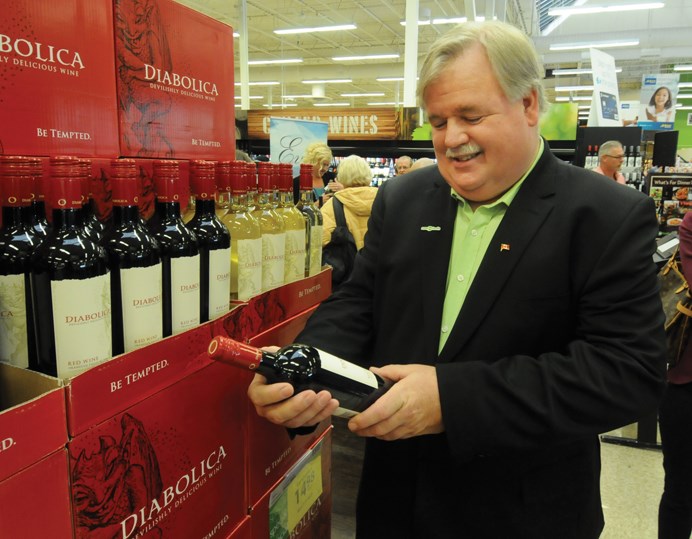North Shore shoppers can now pick up reds, whites and blueberries in the same grocery store.
Save-On-Foods at Pemberton Plaza became the first North Shore grocery store to unveil a wine department May 19.
Related
Cloverley is not necessarily ideal, Pearmain noted. “What we are seeing currently with the Cloverely site is that that’s not … where the most density is,” he said.
The school district considered allowing residential development at Cloverley in 2014 but no plans have been finalized for the site.
Mussatto questioned Pearmain about moving Queen Mary elementary’s International Baccalaureate program to Cloverley.
“I was told that if the IB program wasn’t at Queen Mary there’d be a whole lot of empty spaces,” he said. “So is there any thought about moving the IB program out so that people living in the area can go to that school?”
There are no plans to move Queen Mary’s IB program, according to Pearmain, who explained that provincial law allows parents to enroll their child in any school with an empty desk. Approximately 43 per cent of students in Queen Mary’s catchment area attend the school, which is an increase from 33 per cent in 2012.
Buying land should be a last resort, Mussatto advised.
“We don’t have a lot of land left in Lower Lonsdale and we can’t go without selling it at market value,” he said.
If the school district does buy land, it should consider a city-owned plot on Alder Street (just above the Low Level Road between St. Patricks and St. Davids avenues), suggested Coun. Rod Clark.
Pearmain suggested the new Lower Lonsdale school would have a French immersion program, which rankled Coun. Pam Bookham.
She suggested French immersion might draw students from across the school district, exacerbating “an already existing traffic congestion program.”
Bookham echoed Mussatto’s call to move the IB program, particularly if the move allows more kids to walk to school on city paths “that we have spent a great deal of money on.”
The increasing enrolment is evidence families are moving into Lower Lonsdale, according to Coun. Holly Back. “We definitely are going in the right direction.”
A new school could be located in a development, Back suggested. “It might be a far-out idea, but if we could get maybe a smaller (school) space in one of the amenity spaces in some of these condos – if that’s where the kids are actually living.”
The North Vancouver school district closed nine schools between 2004 and 2012.
The money the district made from sales – at least in part – was due to council’s work of “creating new value” in the city, according to Coun. Craig Keating. “I think it’s up to the school system, the province, to acquire new sites for schools,” he said.
In recent years the school district sold Ridgeway Annex for $5.1 million as well as school board property worth $9 million, but the majority of those funds were immediately funneled into the rebuild of Sutherland secondary and heritage restoration work at Queen Mary and Ridgeway, according to school district treasurer Georgia Allison.
- See more at: http://www.nsnews.com/news/more-families-in-lower-lonsdale-spur-need-for-new-school-1.3093496#sthash.SoSx5xBv.dpufPrevious applications to sell wine on the North Shore have been stymied, with the City of North Vancouver rejecting requests from both Loblaws City Market and Save-On-Foods Capilano.
However, because the zoning at 1250 Marine Dr. in the District of North Vancouver already permitted the sale of alcohol, “there was no council approval required,” according to district spokeswoman Stephanie Smiley.
There are risks connected with allowing alcohol to be sold at grocery stores, according to Mark Lysyshyn, the North Shore and Sea-to-Sky medical health officer for Vancouver Coastal Health.
Grocery stores tend to offer liquor at lower prices, sometimes leading to increased consumption, according to Lysyshyn, who noted in a letter to city council that some shoppers buy alcohol instead of more nutritious food.
Lysyshyn also expressed the concern that underage buyers might have an easier time buying alcohol at grocery stores than liquor stores.
Save-On-Foods has safeguards in place to prevent underage shoppers from walking out with a bottle, according to Julie Dickson Olmstead, spokeswoman for Overwaitea.
With tight security and omnipresent cameras, Save-On-Foods has sold more than one million bottles out of 13 stores in B.C. without a single theft, according to Olmstead.
The store’s cashiers also have a log-in that includes their age. If an underage employee tries to scan a Pinot Gris for a high school friend, the scan fails and there is a request to call a manager, she said.
The store’s standard practice is also to ask for two pieces of ID from any customer who looks younger than 40, according to Olmstead.
“The odds of an underage person getting through a till with one of those bottles of wine is very, very low.”
Save-On-Foods also handles cigarettes and a pharmacy and does all they can to ensure controlled substances don’t end up in the wrong hands, she said.
The store has been a boon for local growers, according to Olmstead, who said Save-On-Foods’ shelves are stocked with wines: “that just aren’t making it onto the shelves in either government liquor stores or private liquor stores.
The B.C. wine and grape industry contributed $2.8 billion to the provincial economy in 2015, according to the B.C. Wine Institute.



